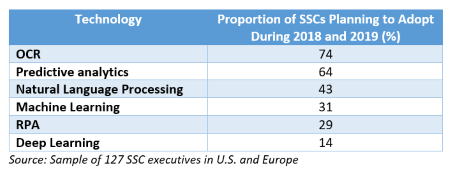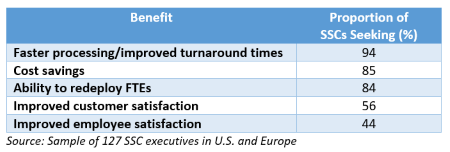posted on Apr 12, 2018 by John Willmott

Shared Services Centers (SSCs) have made progress in the initial application of RPA, gained some experience in its application, and are typically now looking to scale their use of RPA widely across their operations. However, although organizations have often undertaken some level of standardization and simplification of their processes to facilitate RPA adoption, one stumbling block that still frequently inhibits greater levels of automation and straight-through processing is an inability to process unstructured data. And this is limiting the value organizations are currently able to realize from automation initiatives.
NelsonHall recently interviewed 127 SSC executives across industries in the U.S. and Europe to understand the progress made in adopting RPA & AI, along with their satisfaction levels and future expectations. To quote from one executive interviewed, “I think the main strategy in the past has been to avoid unstructured data or pre-process it to make it structured. Now we are beginning to embrace the challenge of unstructured data and are growing an internal understanding of how to piece together automation.”
Low Satisfaction in Handling Unstructured Data Widespread in SSCs
This is an important next step. Unstructured data remains rife in organizations within customer and supplier emails and documents, with, for example, supplier invoices taking on a myriad of supplier-dependent formats and handwritten material far from extinct within customer applications.
This need to process unstructured data impacts not just mailroom document management, but a wide range of shared services processes. By industry sector, the processes that have a combination of high levels of unstructured data and a significant level of dissatisfaction with its capture and processing are:
- Retail & Commercial Banking: new account set-up and customer service
- P&C Insurance: fraud detection, claims processing, mailroom document management, policy maintenance, and customer service
- Telecoms: customer service.
Within finance & accounting shared services, the same issues are found within supplier & catalog management, purchase invoice processing, and 3-way matching.
So, it is highly important that SSCs get to grips within handling unstructured documents and data within these process areas. However, this is unknown territory for many SSCs; they are typically in the early stages of automating handling of unstructured data and lack expertise in effective identification and implementation of suitable technologies. In addition, SSCs often lack the necessary experience in process change management and speed of process change when handling RPA & AI projects. Indeed, SSCs have often struggled in the early stages of automation with the challenge of realizing the expected cost savings from this technology. Applying automation is one thing, but realizing its benefits through effective process change management and ensuring that unexpected exceptions don’t derail the process and the associated cost realization, has sometimes been a significant issue.
Combining OCR & Machine Learning is Critical to Processing Unstructured Data
Accordingly, it is critical that SSCs now automate data classification and extraction from their unstructured documents. At present, 80% of SSCs across sectors are still manually classifying documents, with OCR only used modestly and not to its full potential. However, there are strong levels of intention to adopt OCR and RPA & AI technologies in support of processing unstructured data within SSCs during 2018 and 2019, as shown below:

SSCs are considering a broad range of technologies for processing unstructured data, with OCR clearly a key technology, but further supported by machine learning in its various forms for effective text classification and extraction. To quote from one executive interviewed, “We want to speed up deployment of automation within the mailroom, we want more OCR and natural language processing in place.”
Need for Improved Turnaround Times Now the Main Driving Force
However, in terms of benefits achievement, there is currently quite a significant difference between organizations’ current automation aspirations and what they have already achieved. While organizations placed a high initial emphasis within their automation initiatives on cost savings, and the achievement of cost savings remains very important to SSCs, the focus of executives within SSCs has now increasingly turned to improving process turnaround times.
Within the telecoms sector, this leads to a high expectation of improved customer satisfaction. However, executives with property & casualty and finance & accounting SSCs tend to attach an equal or higher importance to the impact of these technologies on employee satisfaction - by automating some of the least satisfying types of work within the organization, thus allowing personnel to focus on more added value aspects of the process (i.e. other than finding and entering data from customer documents and invoices).
The principal benefits sought by SSCs from implementing RPA & AI in support of processing of unstructured data are shown below:

70% of SSCs Highly Likely to Purchase Operational Service Covering Unstructured Data Processing
While automation is often depicted as having an adverse impact on the outsourcing industry, the reality is often quite the opposite, and organizations seek help in effectively deploying new digital technologies. Indeed, this is certainly the case with unstructured data processing.
SSCs will tend to implement unstructured data handling in-house where the information being handled is highly sensitive, where security is critically important, and where regulation or the set-up of internal systems inhibits use of a third-party service. However, elsewhere, where these constraints do not apply, SSC executives express a high level of intent to purchase external services in support of document classification and extraction of unstructured data. ~70% of SSCs are highly likely to purchase operational services for document processing, including document classification and extraction of unstructured data, while only a minority express a high intent to implement in-house or via a systems integrator.
NelsonHall conducts continuous research into all aspects of RPA and AI technologies and services as part of its RPA & Cognitive Services research program. A major report on RPA & AI Technology Evaluation by Dave Mayer has just been published, and coming soon is a major report on Business Process Transformation through RPA & AI by John Willmott. To find out more, contact Guy Saunders.
